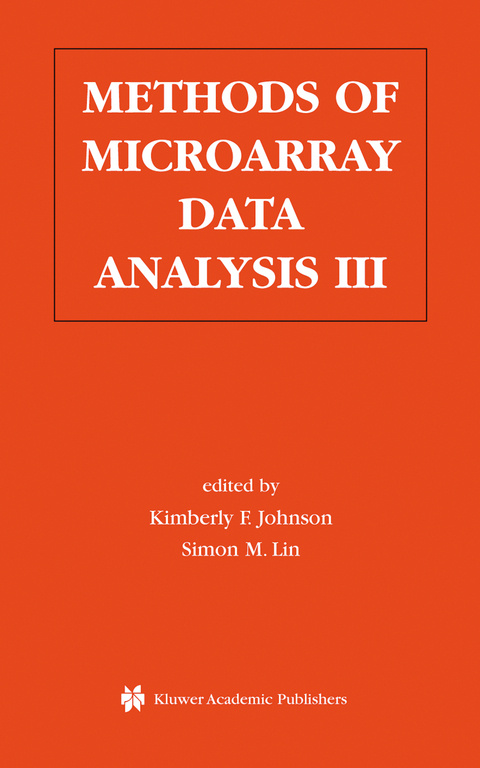
Methods of Microarray Data Analysis III
Springer-Verlag New York Inc.
978-1-4757-8504-3 (ISBN)
Three tutorial papers are presented to assist with a basic understanding of underlying principles in microarray data analysis, and twelve new papers are highlighted analyzing the same CAMDA'02 datasets: the Project Normal data set or the Affymetrix Latin Square data set. A comparative study of these analytical methodologies brings to light problems, solutions and new ideas. This book is an excellent reference for academic and industrial researchers who want to keep abreast of the state of art of microarray data analysis.
Kimberly F. Johnson is Director of Duke Cancer Center Information Systems and Director of Duke Bioinformatics Shared Resource, Duke University Medical Center. Simon M. Lin is Manager of Duke Bioinformatics Shared Resource, Duke University Medical Center.
Tutorials.- The Biology behind Gene Expression: A Basic Tutorial.- Monitoring the Quality of Microarray Experiments.- Outliers in Microarray Data Analysis.- Best Presentation Award.- Organ-Specific Differences in Gene Expression and Unigene Annotations Describing Source Material.- Analyzing Images.- Characterization, Modeling, and Simulation of Mouse Microarray Data.- Topological Adjustments to Genechip Expression Values.- Normalizing Raw Data.- Comparison of Normalization Methods for cDNA Microarrays.- Characterizing Technical and Biological Variance.- Simultaneous Assessment of Transcriptomic Variability and Tissue Effects in the Normal Mouse.- How Many Mice and How Many Arrays? Replication in Mouse cDNA Microarray Experiments.- Bayesian Characterization of Natural Variation in Gene Expression.- Investigating Cross Hybridization on Oligonucleotide Microarrays.- Quantification of Cross Hybridization on Oligonucleotide Microarrays.- Assessing the Potential Effect of Cross-Hybridization on Oligonucleotide Microarrays.- Who Are Those Strangers in the Latin Square?.- Finding Patterns and Seeking Biological Explanations.- Bayesian Decomposition Classification of the Project Normal Data Set.- The Use of Go Terms to Understand the Biological Significance of Microarray Differential Gene Expression Data.
| Zusatzinfo | 1 Illustrations, color; 52 Illustrations, black and white; XI, 252 p. 53 illus., 1 illus. in color. |
|---|---|
| Verlagsort | New York, NY |
| Sprache | englisch |
| Maße | 155 x 235 mm |
| Themenwelt | Informatik ► Theorie / Studium ► Künstliche Intelligenz / Robotik |
| Studium ► 2. Studienabschnitt (Klinik) ► Humangenetik | |
| Naturwissenschaften ► Biologie ► Evolution | |
| Naturwissenschaften ► Chemie ► Physikalische Chemie | |
| ISBN-10 | 1-4757-8504-6 / 1475785046 |
| ISBN-13 | 978-1-4757-8504-3 / 9781475785043 |
| Zustand | Neuware |
| Haben Sie eine Frage zum Produkt? |
aus dem Bereich


